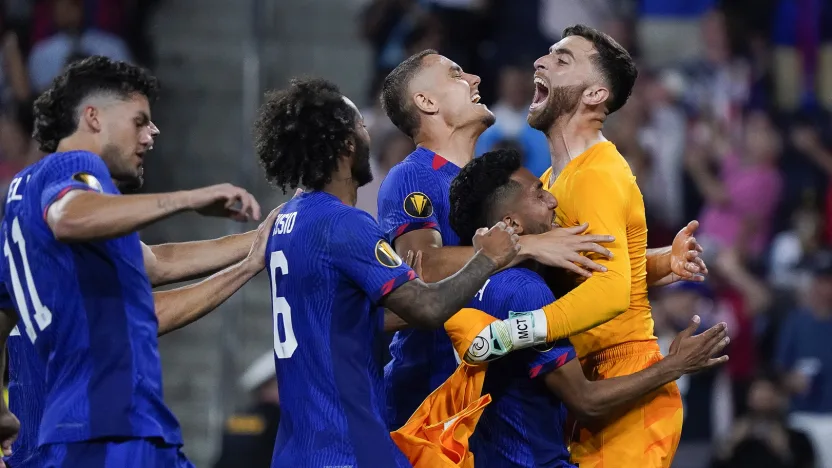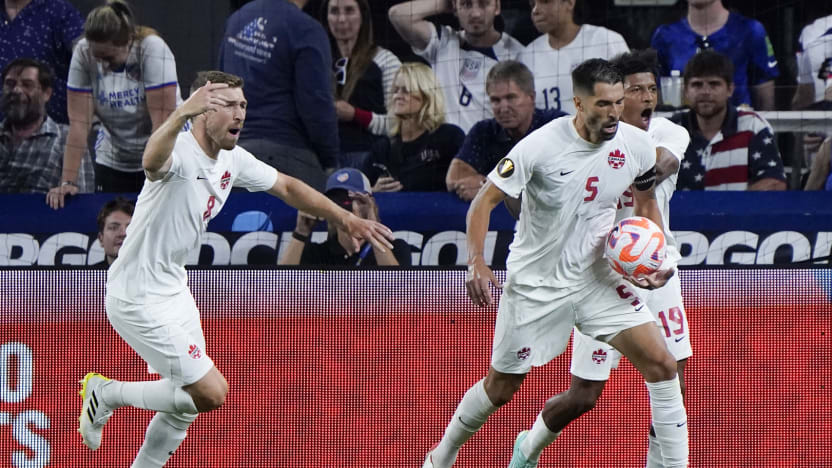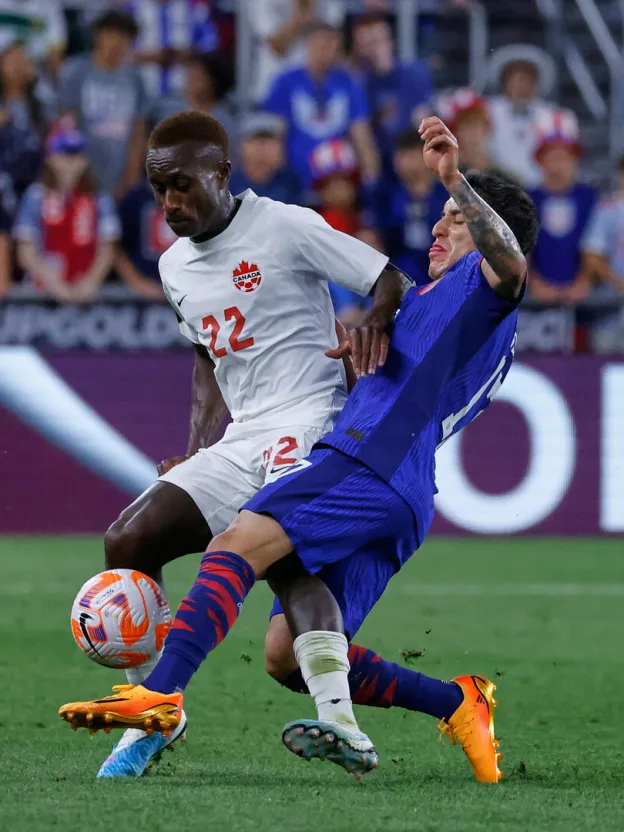Final Score: United States 2-2 Canada (3-2 on penalties)
Goalscorers: Vázquez 88′, Kennedy 114′ (O.G.); Vitória 90+3′ (pen.), Shaffelburg 109′
2023 Concacaf Gold Cup
Quarter-Final
Match in a minute or less
The Canadian men’s national team bowed out of the Concacaf Gold Cup in devastating fashion on Sunday night, as they lost in a penalty shootout to the United States to send the Americans to the semifinals. Most of the 90 minutes in Cincinnati were fairly cagey, but the game came alive late and in the 88th minute the U.S. appeared to have won it when Brandon Vázquez scored to put his side ahead, but moments later, Canada won a penalty kick at the other end for a handball. Steven Vitória stepped up and made no mistake with a penalty down the middle, sending the game to extra time. After 20 minutes of frantic extra time, Canada found a moment of absolute magic. Second-half substitute Jacob Shaffelburg won the ball and drove it forward himself from the left side, getting into the box before unleashing an excellent shot that beat Matt Turner to put Canada ahead. However, the lead would be short-lived, and the U.S. would bring it back to level terms five minutes later as a ball deflected in off Canada’s Scott Kennedy. So, the game proceeded to penalties. Vitória and Liam Fraser missed Canada’s first two attempts, and while Vázquez missed the first for the U.S., the Americans would score their next three, and ultimately Charles-Andreas Brym’s final strike off the crossbar gave the home side the victory.
Three Observations
Penalty kicks giveth and taketh away in heartbreaker for Canada
The Canadian men’s national team has had a strange relationship with the penalty spot ever since Alphonso Davies missed from there at the World Cup. Cyle Larin missed one in the Nations League against Honduras, but Junior Hoilett seemed to right the ship by scoring one against Cuba in the Gold Cup group stage. Then, however, Canada surrendered two penalties to Cuba in that same game. On Sunday in the quarter-final, spot-kicks — or absence thereof — provided a running storyline throughout the contest. In the first half, Canada had two shouts for a penalty: the first, contact with Richie Laryea in the box that may have been innocuous. The second, though, was much more controversial; it seemed almost certain that the referee was going to award a penalty through VAR for a Miles Robinson handball, but ultimately it wasn’t given because of an apparent push in the back prior:
Certainly, that was a call that loomed large when the score was 0-0 (and still does, really). At the end of the 90 minutes, though, Canada’s VAR fortunes seemed to turn around, and another Robinson handball in the box this time did in fact send Canada to the spot. Notably: centre-back Steven Vitória — who scored five penalties this past season for his club Chaves, and has a career record of 18 scored and just three missed — was the one to take the ball and score confidently down the middle. He did not, however, get away with going central again in the first kick of the penalty shootout. Indeed, perhaps there was no other way for this chapter to close for Canada than at the penalty spot. By the time this game got to a shootout, of course, they didn’t have many players on the pitch with any experience taking a penalty other than Vitória — likely candidates like Junior Hoilett and Lucas Cavallini had been sacrificed earlier to inject energy into the side. Still, Kamal Miller and Jacen Russell-Rowe took their attempts well, and Liam Fraser’s penalty wasn’t a bad effort either, but Matt Turner guessed right and stopped him. It’ll be fascinating to see who takes Canada’s next penalty, which will almost certainly come in a match with more of the first-team regulars present. For now, though, they’re left heartbroken by a roller coaster of a match, bookended by a penalty that wasn’t given, and three penalties missed.

Cagey knockout tie gives way to chaos, wide-open final 15 minutes plus extra time
For about 75 minutes or so, this was a pretty standard, if cagey, quarter-final tie; neither side wanted to give much up, and there weren’t a whole lot of grade-A scoring opportunities at either end. As the second half wore on and the score remained 0-0, though, the temperature in Cincinnati seemed to soar and the game suddenly became wide open. The atmosphere in the stadium went from tempered to electric in an instant, when FC Cincinnati pair Brandon Vázquez and Matt Miazga checked into the game — as the crowd had been demanding for a while. After that, the game shifted gears dramatically. The U.S. were immediately at Canada’s throats, and Vázquez had two very dangerous chances just moments before he actually did score to break the deadlock. That moment seemed to awaken something in Canada, who found an extra gear and surged back down the pitch, winning the penalty that sent this game to extra time. When Canada scored the equalizer, they sucked the energy out of TQL Stadium entirely. The deafening roar that had accompanied Vázquez’s goal gave way to complete silence — briefly. There was a period after the goal and before extra time where Canada had the stunned Americans fully on the ropes. They had another couple of attacking sequences, including a corner kick and several decent looks at goal, where Canada could have pressed their advantage and snuck in another goal before their opponents could recover from the gut-punch of the equalizer. That was not to be, though, and they went to extra time. The U.S. came out very strong, but Canada had indeed found new energy — particularly from substitutes like Jacob Shaffelburg and Jacen Russell-Rowe. It was Shaffelburg who scored what could have been a truly iconic Canadian soccer moment in the second extra time period, but the U.S. — as Canada had done in reverse not long before — punched right back after conceding. Canada may regret backing off a bit and trying to see out the one-goal victory, because they invited American pressure and, eventually, conceded the goal. To lose on penalties to your greatest rival is a painful way to exit a tournament, but the consoling fact is that Canada definitely delivered their best performance of the 2023 Gold Cup when they needed it most. It ultimately wasn’t quite enough, and this will forever be a match rife with what-ifs, but both Canadian and American fans alike will remember the utter chaos that finished this game, far more than the sluggish 70 minutes that began it.

Canada show more of transitional, vertical game; Shaffelburg a late game-changer
In all three of Canada’s group stage games, they were the side with a heavy advantage in possession. Opposing teams — Guatemala in particular — were content to keep their shape compact and frustrate a Canadian side that struggled to break them down or create attacking space for themselves. This time, against a United States side that wanted the ball more, Canada actually looked more like themselves. In their 3-5-2 formation, both Richie Laryea and Liam Millar were called on to do a lot of running as wingbacks, but they did those jobs well. Canada finished with just 32.7 per cent possession, and on the losing end of most statistical categories, but they won more duels (62 to 55), made more tackles (12 to 6) and generally seemed to have success in their game plan of stifling the American attack and creating opportunities for quick breaks. Of the nine shots the U.S. took in the first 70 minutes of the game before all hell broke loose, only two were on target. For a while, Canada’s backline was actually doing quite a good job of keeping Dayne St. Clair’s life easy in goal — although that wasn’t necessarily the case later in the match. Still, Canada’s back three was well-organized and managed to isolate Gold Cup leading scorer Jésus Ferreira, who had just one shot on target. When the match’s pace had changed entirely, there was no better difference-maker for Canada to bring on than Jacob Shaffelburg. The Nova Scotia native came on in the 86th minute and was probably the best player on the pitch from then on, working tirelessly against a tiring U.S. team to win the ball and get it forward on the counter-attack. The game continued to get more and more open with play moving from end to end in transition, and Shaffelburg thrived. The climax of Shaffelburg’s high-energy outing was, of course, his goal — which may one day be forgotten because of how this game ended, but shouldn’t be, because it’s one of the best moments Canada have ever had at the Gold Cup. The way he battled with Bryan Reynolds to get the ball back, then sprinted off on the counter, took on Matt Miazga, and finished so coolly — tremendous stuff from the Haligonian-turned-Nashvillian.
That was an incredible way for Shaffelburg to score his first goal for Canada. It’s a shame it didn’t go down as the match winner, which would’ve been a truly incredible ending, but nonetheless a thrilling moment.
CanPL.ca Pla****yer of the Match
Dayne St. Clair, Canada
The Minnesota United goalkeeper made seven saves for Canada, many of them astounding fingertip stops to keep his team alive at critical moments. He got a glove on Jésus Ferreira’s winning penalty and will regret that he couldn’t keep it out, but overall St. Clair made a strong case for himself as Canada’s next starting goalkeeper.
What’s next?
The United States will now move on to the Gold Cup semifinal against Panama, which they’ll play this Wednesday, July 12 at Snapdragon Stadium in San Diego. Watch all CPL matches live on OneSoccer. In addition to its website and app, OneSoccer is now available on TELUS channel 980 and on Fubo TV. Call your local cable provider to ask for OneSoccer today.
